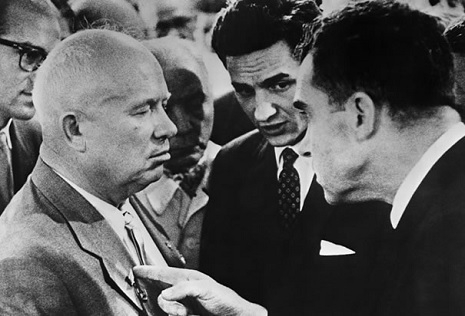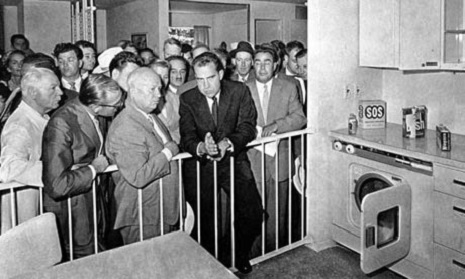
Nice body language, Dick. Photo credit: Elliot Erwitt.
In 1959, Richard Nixon and Nikita Khrushchev met in Moscow in a highly publicized diplomatic event. The highlight of the trip was a visit to the American National Exhibition, a sort of cultural exchange fair where the US could showcase all the amenities afforded to its citizens by capitalism. The US public relations strategy was to get the world to associate us with modern conveniences and easy living. What could go wrong?
Unfortunately for Nixon, Khrushchev decided to dispense with the formalities and staged a delightfully bitchy political debate with the then Vice President over the exhibit displaying a “typical” California kitchen. Below is the transcript and a partial video excerpt from the famous Kitchen Debate, wherein a flustered Nixon attempts to gracefully field criticism with a little slick diplomacy (it doesn’t quite work). The entire exchange is done through translators, but there’s not much a gentler tone could do to ease the tension—not that Khrushchev had any intention of doing so. Some things translate loud and clear.
Over three million Russians actually ended up attending the fair, and the crowds often echoed Khrushchev’s particularly volatile brand of interrogation. Audiences would ask personal questions of the tour guides, often berating them with leading questions about American racism, our lack of universal health care, and social security. Of course the guides were instructed to politely admit that the U.S. wasn’t perfect, but a dynamic work in progress, nonetheless.
The entire premise of the exhibit was just a show of Cold War dick-measuring, and the Kitchen Debate was the big finish. By the end, both men believed they had “won,” and the two shook hands, agreeing to broadcast the entire conversation in their respective countries.The U.S. went off half-cocked and aired the segment on three networks, which angered the Soviets, who had assumed they would coordinate simultaneous broadcasts. The Soviets then threatened not to show it at all, but after a few days it was aired, though with Nixon’s words only partially translated.
[Both men enter kitchen in the American exhibit.]
Nixon: I want to show you this kitchen. It is like those of our houses in California.
[Nixon points to dishwasher.]
Khrushchev: We have such things.
Nixon: This is our newest model. This is the kind which is built in thousands of units for direct installations in the houses. In America, we like to make life easier for women…
Khrushchev: Your capitalistic attitude toward women does not occur under Communism.
Nixon: I think that this attitude towards women is universal. What we want to do, is make life more easy for our housewives…..

Photo credit: Associated Press
Nixon: This house can be bought for $14,000, and most American [veterans from World War II] can buy a home in the bracket of $10,000 to $15,000. Let me give you an example that you can appreciate. Our steel workers as you know, are now on strike. But any steel worker could buy this house. They earn $3 an hour. This house costs about $100 a month to buy on a contract running 25 to 30 years.
Khrushchev: We have steel workers and peasants who can afford to spend $14,000 for a house. Your American houses are built to last only 20 years so builders could sell new houses at the end. We build firmly. We build for our children and grandchildren.
Nixon: American houses last for more than 20 years, but, even so, after twenty years, many Americans want a new house or a new kitchen. Their kitchen is obsolete by that time….The American system is designed to take advantage of new inventions and new techniques.
Khrushchev: This theory does not hold water. Some things never get out of date–houses,for instance, and furniture, furnishings–perhaps–but not houses. I have read much about America and American houses, and I do not think that this is exhibit and what you say is strictly accurate.
Nixon: Well, um…
Khrushchev: I hope I have not insulted you.
Nixon: I have been insulted by experts. Everything we say [on the other hand] is in good humor. Always speak frankly.
Khrushchev: The Americans have created their own image of the Soviet man. But he is not as you think. You think the Russian people will be dumbfounded to see these things, but the fact is that newly built Russian houses have all this equipment right now.
Nixon: Yes, but…
Khrushchev: In Russia, all you have to do to get a house is to be born in the Soviet Union. You are entitled to housing…In America, if you don’t have a dollar you have a right to choose between sleeping in a house or on the pavement. Yet you say we are the slave to Communism.
Nixon: I appreciate that you are very articulate and energetic…
Khrushchev: Energetic is not the same thing as wise.
Nixon: If you were in the Senate, we would call you a filibusterer! You–[Khrushchev interrupts]–do all the talking and don’t let anyone else talk. This exhibit was not designed to astound but to interest. Diversity, the right to choose, the fact that we have 1,000 builders building 1,000 different houses is the most important thing. We don’t have one decision made at the top by one government official. This is the difference.
Khrushchev: On politics, we will never agree with you. For instance, Mikoyan likes very peppery soup. I do not. But this does not mean that we do not get along.
Nixon : You can learn from us, and we can learn from you. There must be a free exchange. Let the people choose the kind of house, the kind of soup, the kind of ideas that they want.
[Translation lost as both men enter the television recording studio.]
Khrushchev: [In jest] You look very angry, as if you want to fight me. Are you still angry?
Nixon: [in jest] That’s right!
Khrushchev:…and Nixon was once a lawyer? Now he’s nervous.
Nixon: Oh yes, [Nixon chuckling] he still is [a lawyer].
Other Russian speaker: Tell us, please, what are your general impressions of the exhibit?
Khrushchev: It’s clear to me that the construction workers didn’t manage to finish their work and the exhibit still is not put in order…This is what America is capable of, and how long has she existed? 300 years? 150 years of independence and this is her level. We haven’t quite reached 42 years, and in another 7 years, we’ll be at the level of America, and after that we’ll go farther. As we pass you by, we’ll wave “hi” to you, and then if you want, we’ll stop and say, “please come along behind us.” …If you want to live under capitalism, go ahead, that’s your question, an internal matter, it doesn’t concern us. We can feel sorry for you, but really, you wouldn’t understand. We’ve already seen how you understand things.
Other U.S speaker: Mr. Vice President, from what you have seen of our exhibition, how do you think it’s going to impress the people of the Soviet Union?
Nixon: It’s a very effective exhibit, and it’s one that will cause a great deal of interest. I might say that this morning I, very early in the morning, went down to visit a market, where the farmers from various outskirts of the city bring in their items to sell. I can only say that there was a great deal of interest among these people, who were workers and farmers, etc… I would imagine that the exhibition from that standpoint would, therefore, be a considerable success. As far as Mr Khrushchev’s comments just now, they are in the tradition we learned to expect from him of speaking extemporaneously and frankly whenever he has an opportunity. I can only say that if this competition which you have described so effectively, in which you plan to outstrip us, particularly in the production of consumer goods…If this competition is to do the best for both of our peoples and for people everywhere, there must be a free exchange of ideas. There are some instances where you may be ahead of us–for example in the development of the thrust of your rockets for the investigation of outer space. There may be some instances, for example, color television, where we’re ahead of you. But in order for both of us benefit…
Khrushchev: [interrupting] No, in rockets we’ve passed you by, and in the technology…
Nixon: [continuing to talk] You see, you never concede anything.
Khrushchev: We always knew that Americans were smart people. Stupid people could not have risen to the economic level that they’ve reached. But as you know, “we don’t beat flies with our nostrils!” In 42 years we’ve made progress.
Nixon: You must not be afraid of ideas.
Khrushchev: We’re saying it is you who must not be afraid of ideas. We’re not afraid of anything….
Nixon: Well, then, let’s have more exchange of them. We all agree on that, right?
Khrushchev: Good. [Khrushchev turns to translator and asks:] Now, what did I agree on?
Nixon: [interrupts] Now, let’s go look at our pictures.
Khrushchev: Yes, I agree. But first I want to clarify what I’m agreeing on. Don’t I have that right? I know that I’m dealing with a very good lawyer. Therefore, I want to be unwavering in my miner’s girth, so our miners will say, “He’s ours and he doesn’t give in!”
Nixon: No question about that.
Khrushchev: You’re a lawyer of Capitalism, I’m a lawyer for Communism. Let’s kiss.
Nixon: All that I can say, from the way you talk and the way you dominate the conversation, you would have made a good lawyer yourself. What I mean is this: Here you can see the type of tape which will transmit this very conversation immediately, and this indicates the possibilities of increasing communication. And this increase in communication, will teach us some things, and you some things, too. Because, after all, you don’t know everything.
Khrushchev: If I don’t know everything, then you know absolutely nothing about Communism, except for fear! But now the dispute will be on an unequal basis. The apparatus is yours, and you speak English, while I speak Russian. Your words are taped and will be shown and heard. What I say to you about science won’t be translated, and so your people won’t hear it. These aren’t equal conditions.
Nixon: There isn’t a day that goes by in the United States when we can’t read everything that you say in the Soviet Union…And, I can assure you, never make a statement here that you don’t think we read in the United States.
Khrushchev: If that’s the way it is, I’m holding you to it. Give me your word…I want you, the Vice President, to give me your word that my speech will also be taped in English. Will it be?
Nixon: Certainly it will be. And by the same token, everything that I say will be recorded and translated and will be carried all over the Soviet Union. That’s a fair bargain.
The Kitchen Debate. One of the first uses of color videotape, which was provided by the Ampex corporation. The impromptu international game of Soviet vs. Yank one-upmanship was shot at the Ampex booth at the fair.





